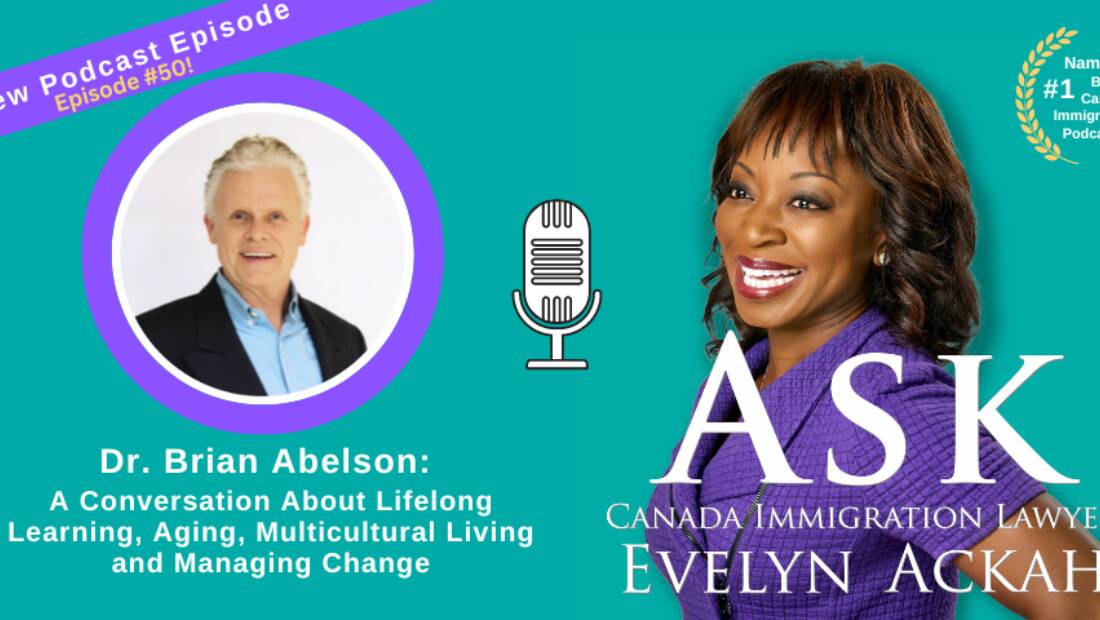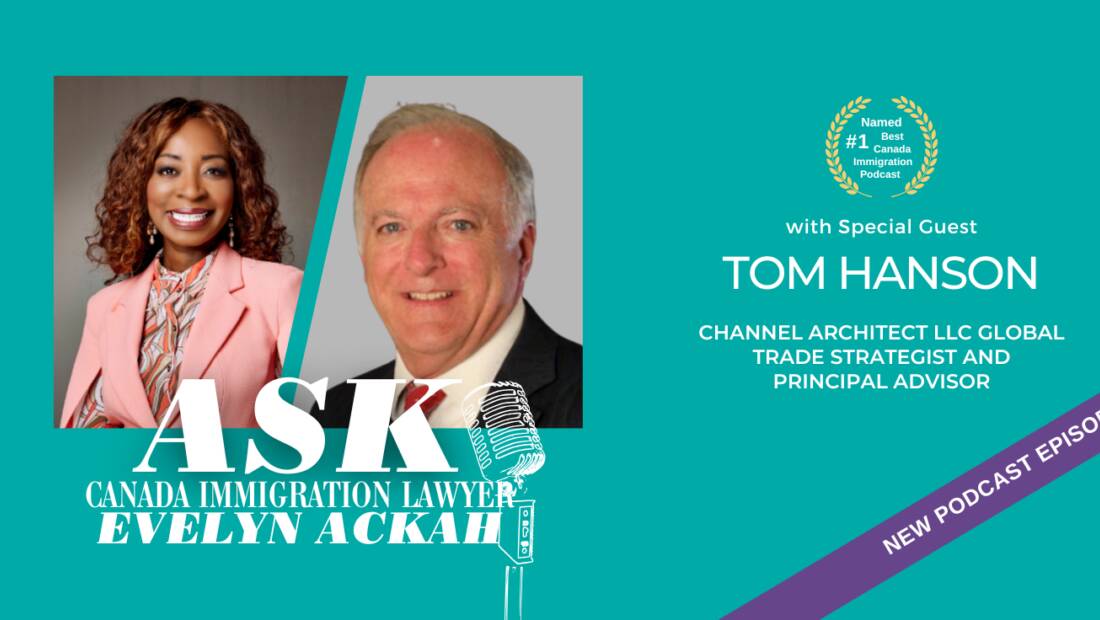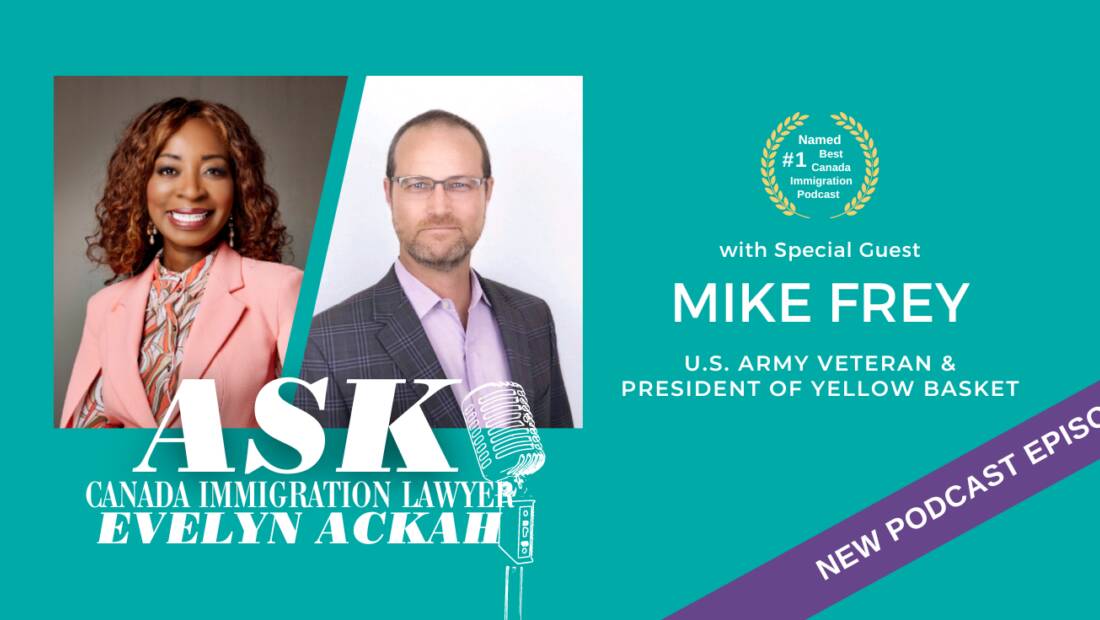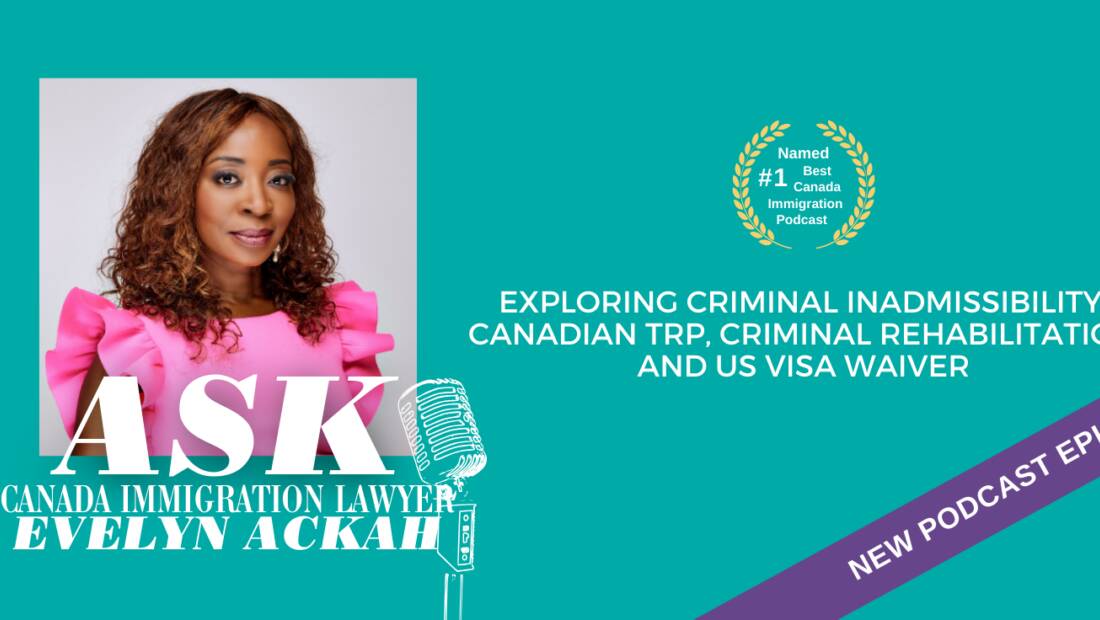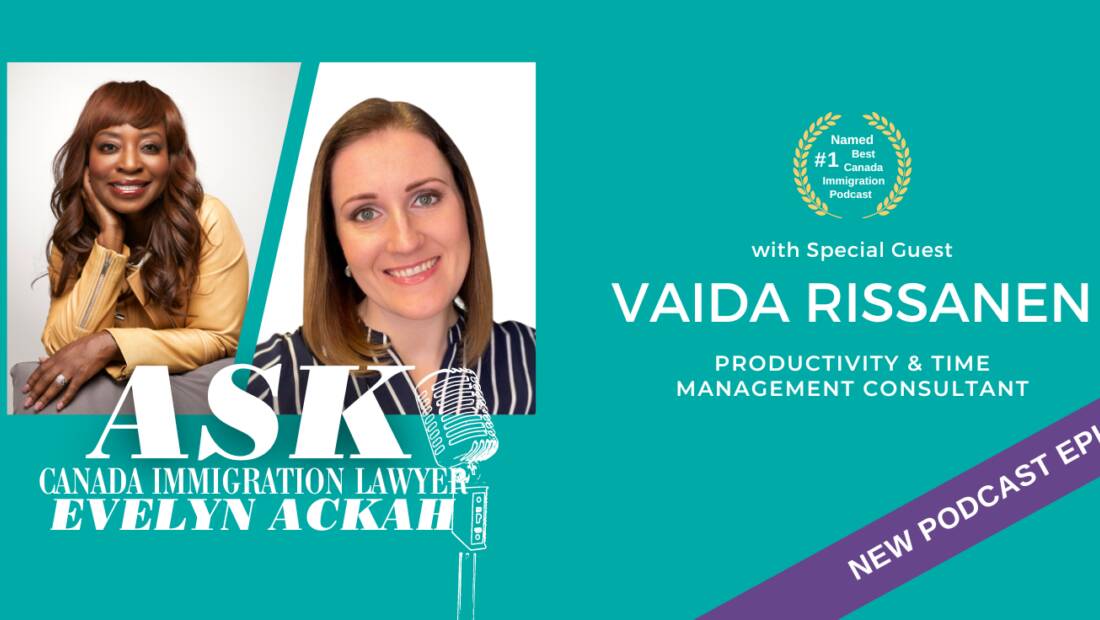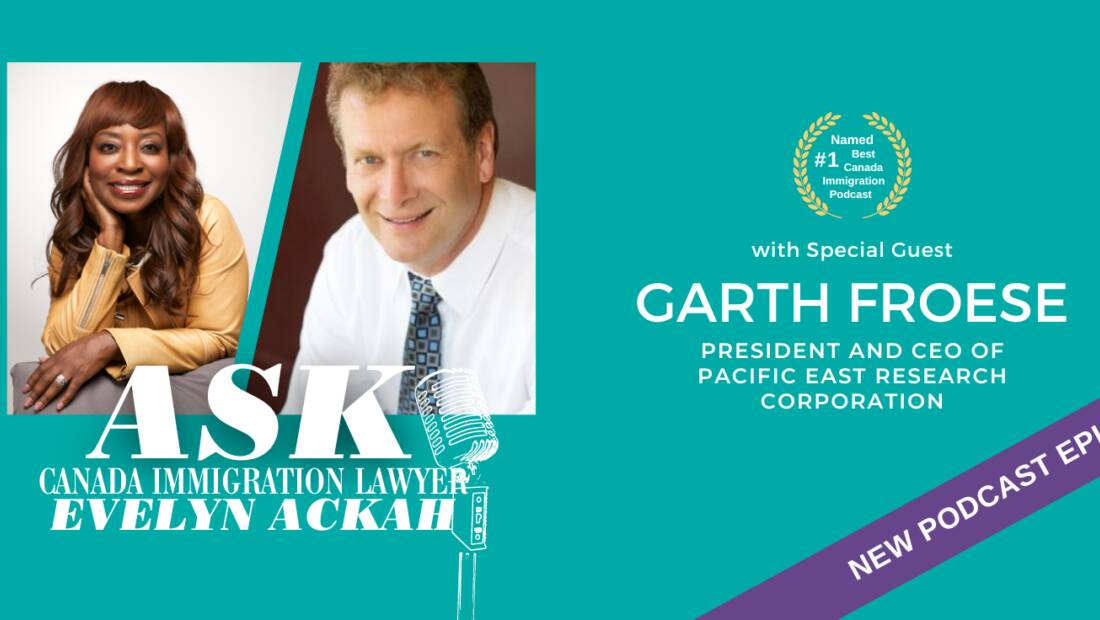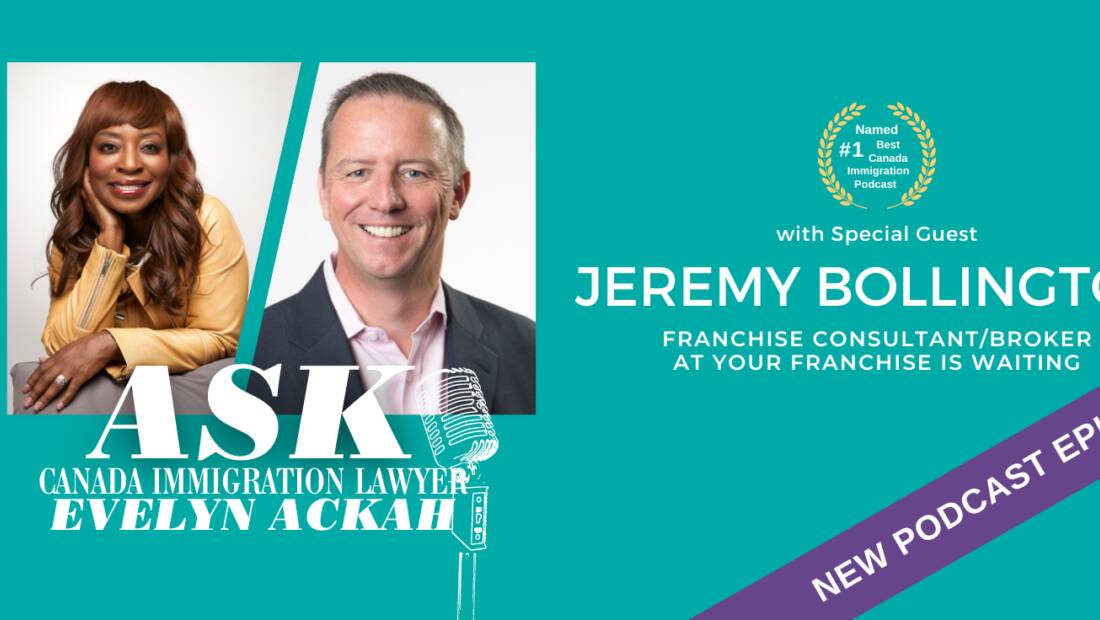Or listen on your favourite podcast app
BOOK YOUR FREE CASE EVALUATION
Calgary immigration lawyer Evelyn Ackah talks to Dr. Brian Abelson, DC, a Doctor of Chiropractic, the developer of Motion Specific Release (MSR), an International Best Selling Author, and founder of Kinetic Health in Calgary, Alberta. He is also Evelyn's chiropractor and friend. Dr. Abelson lives in a multicultural family, is a world traveller, philanthropist, marathon runner and triathlete. He has a firm belief in living a holistic lifestyle. Evelyn and Brian discussed a wide range of topics including:
- The benefits of curiosity and lifelong learning
- Aging, tai chi and combining art and science as we age
- Canada's diversity and aging population
- Attitudes surrounding charity, immigration and politics
- Managing change and challenges
Dr. Abelson also teaches Tai Chi on his YouTube channel @KineticHealthOnline.

About Evelyn Ackah
Evelyn Ackah is the Founder and Managing Lawyer at Ackah Business Immigration Law. We work with individuals and business owners from all over the world who want to cross borders seamlessly. For more information on immigration to Canada or the United States, Ask Evelyn Ackah at Ackah Business Immigration Law today at (403) 452‑9515 or email Evelyn directly at contact@ackahlaw.com.
The Ask Canada Immigration Lawyer Evelyn Ackah podcast by Calgary Immigration Lawyer Evelyn Ackah was named #1 Best Canada Immigration Podcast in 2022 by Feedspot.
BOOK YOUR FREE CASE EVALUATION
Transcript:
Evelyn Ackah:
Good day everyone. This is Evelyn Ackah from the Ask Canada Immigration Lawyer podcast. I am so excited today because I get to have on our show Dr. Brian Abelson. Welcome, Dr. Abelson.
Dr. Brian Abelson:
That's great to be here. Thanks for having me, Evelyn.
Evelyn Ackah:
Thank you so much. I'm excited to have Dr. Abelson, because he's my chiropractor here in Calgary. His clinic is called Kinetic Health, and it's been a godsend for me and my old hips and my back. But also I've gotten to know Dr. Abelson because he is so accomplished and he's done so many things. I just want to give you a quick overview of his background, so you know who we're talking about. Dr. Abelson is a doctor of chiropractic medicine. He has done a lot of work in chiropractic as well as with training and developing new chiropractors and also for continuing education. He has written a number of books and articles related to his field, and he has done a lot of philanthropy around the world and has traveled extensively, and we just really get along and I like talking to him about his philosophy on life. He's also an avid wellness focused doctor, which includes Tai Chi. He has his YouTube channel, and there's lots more to learn, photography. But I'd like to just welcome you, Dr. Abelson for starting our new year off January 2023 on a positive wellness focus.
Dr. Brian Abelson:
I totally agree that we need to bring some positivity into the conversation, instead of that everything going on in the world that people have a tendency to forget there. We still live in an incredible world, incredible environment, and there's so much that we need to explore and share.
Evelyn Ackah:
Well, I'd love to ask you to start our conversation. As I noticed, I mean I've gone to other doctors and they do their thing and I leave and we don't really get to know who they are. And one thing I really love about your clinic is that there's a real sense of wanting to know more about your patients. And so over time decides just what do you do for a living? It was, what do you do when you're not working? What does your husband do? Tell me about your kids. Tell me where you travel. What is your thought on what the latest current events? And so I'm interested by that because it's a very different experience. So how did you become more, I don't know, maybe more open because you're also very generous with what you share about your family as a practitioner. When did that start for you?
Dr. Brian Abelson:
Well, I think it basically boils down to why I'm in practice. I'm in practice because I enjoy working with people. I don't just want to go in through the motions. I'm 66 years old right now.
Evelyn Ackah:
Wow.
Dr. Brian Abelson:
I could be retired right now, but instead of, I choose to keep working because I really enjoy helping people. I really enjoy getting to know people. And for me to get to know them, I have to figure out what is it this individual is trying to achieve? What is it about them? What is about their psyche? What's important to this person? For some people when they come in, maybe they want to be just functional, maybe they just want to get up and spend time with their family. Doing things For other people, they've actually limited themselves to saying, "okay, I'm at this age, so I can't really do certain things right now, or I'm fitting into this box."
But that's not reality. The reality is that usually our limitations are self-imposed. So when I get to know them, if we have a conversation, people start to realize that there are other options. So I really enjoy what I do, and part of that is just getting to know the diversity of the people who walk in the door. And I love that people come from different backgrounds, different cultures. That started a long ago, I think I've told you, my wife, she may have grown up in Canada, but she's from South India. So I got to know that culture and I've done a lot of traveling around the world, and I go to these places to learn things. And it's such an incredible opportunity.
Evelyn Ackah:
I think that's what really makes the visits really cool for me. And as well, there's like international art all over the place and just give you a sense of who you are as a person. So I've learned a lot about you over the last couple years, and for me, the interest is in your worldview about diversity of all kinds, your worldview about giving back to community. You've done a lot, you and your wife and your clinic with the UNHCR, World Wildlife Fund, Plan International and other organizations that you support. When did you start becoming or recognizing maybe just like you and I feel, the sense of responsibility and the privilege we have to be able to contribute? When did that develop in you?
Dr. Brian Abelson:
I think what you just said in terms of the, it's a privilege, actually. So for a long time, we've always supported a lot of kids through Plan, for example. And you see these kids and you start to realize some of these countries that I've traveled through, people are very, actually, they may be poor, but they're happy, but they may lack opportunities, a particular area. So I realize that even though it may be a small thing, I actually can make a difference. So something, I think that when I started traveling through Africa when I was only, well, not even 20 years old, and seeing people in certain circumstances, and I was thinking, "Okay, how can I help these individuals?" I mean, they actually come from very rich cultures and they come from, there's so much that I've learned there, but what can I do to help to support in a little way.
So I realized things like Plan Canada can actually help to pay for education in a certain area or help to support a system that's already there. That for me is, that's probably the highlight of my career, being able to get involved and do something. Yeah, the thing that kind of aggravates me sometimes is I'll see people saying what problems are, but they're not doing anything about it. So I think all of us have to take some type of action. It doesn't matter what it is, but you have to choose something and you actually have to do something.
Evelyn Ackah:
Yeah. I mean, where do you think that came from? Because you're a white guy from Canada. I mean, obviously I'm married to a white guy, so you and I both have very interracial families and diverse families, which is also another thing that's kind of cool. But-
Dr. Brian Abelson:
Yeah, my kids look Italian.
Evelyn Ackah:
Yeah, I'm sure. Gorgeous. I'm sure. Right? And so it's kind of like, where do you think you got that from? Because for me, as an immigrant, I recognize that because I've come from Ghana, a country that has lots of wealth and lots of poverty. It's a very broad spectrum. And I have seen how privileged I am to have been able to immigrate here with my family at age five and launch my life here. So I think for me, that sense of privilege and obligation to give back through all the generations, my parents and now my sister and I, we give back. We support our cousins and second cousins and aunt, whatever we can for school and health care and everything else because we recognize that. But for somebody who grew up in North America, who is the dominant community, where do you think that came from?
Dr. Brian Abelson:
That's an interesting term, dominant community. That always had the perspective that we have a lot of different parts, but the whole is always much strong, not just stronger, but greater than these smaller aspects. And we look at Canada, and a long time ago I realized we are a very diverse population made up of sections from all over the world. My grandparents came from Norway and Sweden, homesteaded in Alberta. My dad was born in a sod hut, but I grew up, they always talked about the fact that there's all these different sections and they all have great value. So maybe I just grew up in a home that you're right, I am a white guy from Canada, but I'm also exposed to open ideas at a fairly young age in terms of respect, but not just about, I don't like this idea of tolerating cultures. Let's celebrate.
Evelyn Ackah:
Embracing them.
Dr. Brian Abelson:
There's so much to learn. And even at the age that I have, my current age here, I realize that there's so much more that I can learn and share. And it's ingrained in my-
Evelyn Ackah:
I love it. I mean, I think this is why you're so active and that's why you're still working because you want to. It's that sense of curiosity. And as we age, sometimes people lose that. I have a godmother, I've told you about her before, she's a retired psychologist, a PhD doctor, and she's 84, and she knows more about her iPhone and her iWatch and technology, and she's reading all the time. And she just keeps that. And I feel like that is helping her age well, that sense of curiosity. So when you've travelled, what was it about travelling that really caught you, that got you interested when you were young at 20 years old to go to Africa? That's not a typical experience. They go to Europe or you go to Latin America. Where was that interest for you?
Dr. Brian Abelson:
Yeah. I mean, that actually started out travelling through Europe. And I love Europe and I still love to go there and there's so much culture. But it's funny, when I got down and I went through Egypt and actually went through it first through the Sudan and Uganda, a lot of places. I'd be in these areas and it's just like, this was great in Europe, but wow, I've stepped into a whole new world here and I don't really know that much about it. But I mean, it just grips you in terms of the culture, just everything, the food, the people, the music. There's so much to learn. And right now too, actually in a couple weeks here, my wife and I are heading down to Chile and Argentina.
Evelyn Ackah:
Wow.
Dr. Brian Abelson:
And when I look at that area down there, I haven't been to Chile before and I'm really looking forward to it. The more you explore in the north, the Atacama desert you're talking about, this is an area where the Kitchawan, the Incas went through and they created this massive tract of 16,000 kilometers of trails. And I didn't know much about this area. I mean, there's so much to learn. I mean, yes, we go down to Patagonia and people say, "Okay, so you're going to go down and join some hiking group." Actually, my wife and I know, we're going to actually go down and do a bunch of trails down there and hike. And "Why aren't you afraid of this?" I'm like, "Afraid of what?"
Evelyn Ackah:
Yeah, yeah. It's a curiosity. Yeah. I think what I love too is that when you travel, you have the experience of being the other. Do you know what I mean? There's something about, I remember when I took my kids to Ghana for the first time, my son said, "I've only seen four white people in three weeks." And it was their first experience of being embedded in a predominantly black community, which they don't have the opportunity on a regular basis. So I think you going to these countries, you probably gain a real sensitivity because you also are looked at differently. People notice you. You had blonde hair before it turned gray.
Dr. Brian Abelson:
White hair.
Evelyn Ackah:
And you're become very much, "Wow, look at that person." But you also experience being the other. Tell me about that experience. Do you know what I mean by that?
Dr. Brian Abelson:
Actually, it's interesting you mentioned that because one of the things my wife talks about is when she actually goes to certain areas, she will stand out here. But then she goes there and it's like, okay, she's not standing out at all. It's like this is just the norm. And it has opened my eyes to the fact that our perceptions and how we are perceived in certain environments. And it's kind of nice though because somebody will be looking and say, this person here, but you sit down with them and start talking about things and obviously you show respect to their culture and you start to ask some questions about things and they're so happy to share everything with you. And I think that really taught me how to be a little more open.
Evelyn Ackah:
Yeah, no, I think it's a wonderful thing. I mean, you bring that to the practice and what we wanted to, but for me, as I'm getting older, oh, and another year is coming.
Dr. Brian Abelson:
So if you're getting older than I'm ancient.
Evelyn Ackah:
You're getting better. You're getting better. But I think aging well is really important. It's not just getting old. I want to be like you, want to be like my godmother at 84. I want to be as mobile and active and alert as possible. So how have you been able to do that? Because I know a lot of 66 year olds who are not as active as you, who aren't working because they maybe can't even if they wanted to. And especially with the physicality of chiropractic. How have you kept that wellness in your life?
Dr. Brian Abelson:
Well, I think it's also the realization that we're all going to get injured at certain points. I was involved in the triathlon community, in the running community for 30 years, and so I had a lot of different injuries over a period of time. But you rehab them, you get stronger, you move on, and quite often these things don't have to affect you, and you kind of carry that forward in terms of the aging process. Then you realize that if I do stay active, certain things aren't going to change that much. For example, hormones in the body, testosterone, growth hormones, we start weight training these levels that maybe low as we age, start to come back up again. We have things like sarcopenia, what happen with aging or muscle loss. We can reduce that significantly and quite often bring more muscle mass back. People realize, they think, "Well, there's nothing I can do about that." But quite often they're wrong.
We don't move, things start to tighten up. I'm always talking to people about our muscles start to, sounds really bad, but in terms of gristle in a piece of steak or something. Keep moving, blood flow, you do cardiovascular stuff. It really has a massive effect on the aging process.
Evelyn Ackah:
So I mean, noticed as I've gotten older, I have to stretch more. Like I was a runner that didn't really stretch very much when I was younger because I didn't need to and I didn't have the effects of it. And now I get out of bed, I have to stretch. You've given me all these exercises and my trainer too, because my body is stiff after sitting at a desk for 10 hours or longer a day. So in terms of your thinking as we age, obviously diet is important, but weight training is significant.
Dr. Brian Abelson:
Not one thing. Well, first of all, when it comes to exercise, find something you really enjoy doing. My wife loves to dance.
Evelyn Ackah:
Good.
Dr. Brian Abelson:
So getting out and dancing, that's great for plasticity, it's great for balance, it's great for cardiovascular stuff. But you're right, the weight training there, when we teach, I teach Tai Chi. Showing people in terms of balance one leg and people say, "Well, what kind of effect does this have on individuals?" And I try and actually show practitioners some of the exercises here, and then they kind of like, "Eh, this is something I don't really want to be doing." And then you start looking back at the research. I love combining art and science. You look at the science behind that and you go, okay, through MRI studies and nerve conduction tests and stuff, we realize that people who do Tai Chi, they actually have the same tactile sensitivity as a person who reads braille.
Evelyn Ackah:
Wow.
Dr. Brian Abelson:
So you'll say you're a practitioner and then you're palpating somebody. You're going to have a real good sense in terms of what's going on there. And so somebody says, "Well, okay, I haven't done this ever." But it doesn't matter what the age is, you can get stronger, you can get faster, you can get better balance, you can actually improve your nervous system. I mean, there's so much that can be done.
Evelyn Ackah:
Can be done.
Dr. Brian Abelson:
I was talking about I hope that when I get to a certain point in my life, I just kind of slide into base and I'm gone, but I'm still active the whole time.
Evelyn Ackah:
Yeah, I hear you. I want to age well. And I think when we talk about, I love the discussions we have because they make me really think about everything from donating to charity, the things I'm involved with immigration, and we talk a lot about immigration and what we're seeing in the politics of life. What are your views generally about Canada and the fact that we are such a diverse community and we do need more people? We are an aging population.
Dr. Brian Abelson:
Oh, totally.
Evelyn Ackah:
Yeah.
Dr. Brian Abelson:
I think it's very exciting. Actually, I was looking over one of your videos there and fairly recent one and you're talking about is it 500,000 new immigrants they're going to be bringing in?
Evelyn Ackah:
Yeah.
Dr. Brian Abelson:
And I think it's great. I think it's really good. I think we need the more, better and from diverse areas is really important. And I think that brings strength. It's like a similar idea when I'm treating people, I teach a program called MSR, Motion Specific Release. It's not a technique. What it is a treatment system where I bring in multiple modalities and basically I can achieve better results by combining different perspectives. And I look at our society as a whole. The more immigrants who get, the more perspectives we have, the stronger our society is. Basically we're going to have a much larger identity. I think the danger quite often in life is having a very small identity and a lot of power. We have to expand our perspectives on life.
Evelyn Ackah:
I really agree with that. Tell me about, I just wanted to touch base on this whole sense of integrating in the different modalities because one thing is I have a family doctor. I have my chiropractor who is you and your clinic also does massage. And you're saying you're doing the MSR. Is that right?
Dr. Brian Abelson:
MSR, Motion Specific Release.
Evelyn Ackah:
And you also do acupuncture and other things. So what other modalities are you offering at the clinic? Because I also go to acupuncture sometimes and more for stress management, but I love the idea of this integration of medical supports from whether it's from traditional Chinese medicine, from modern medicine, from hormone doctors. What do you think about that? Well, what do you offer at Kinetic Health?
Dr. Brian Abelson:
Well, our primary focus is musculoskeletal care. Of course, when we're going through stuff, sometimes people will come in and for example, let's say they have sleep apnea and not sleeping. I'm going to refer out to somebody who deals specifically with that, or somebody may be under stress or anxiety. So it's having all these different portals. But what we try and do is we look at it and we go, okay, in terms of just musculoskeletal care, we have a soft tissue system. So muscles, ligaments, tendons, nerves, cardiovascular, an osteo system we're going to deal with in terms of chiropractic. But one of the essentials is going to be exercise. So a graded program in terms of looking at their mobility, looking at their strength, looking at their balance, looking at things we can do to actually activate their nervous system.
So musculoskeletal envelope involves a lot of things, but it involves cooperation. So in other words, someone comes in and I'm doing a physical examination, part of what we offer is the fact that I'm going to do a competent orthopedic and neurological examination. So I can figure whether something is within my scope of practice and it falls within a particular area. And if it doesn't fall within there, I'm going to refer out to a medical practitioner and thank God they're there in terms of it could have an infection. I mean, in terms of our scope of practice, we're authorized for everything from X-rays, ultrasound, I can order MRIs and whatever, but the only reason I do that is to rule out other pathologies. So what I can offer is comprehensive analysis, a very logical treatment system, and I guess to be treated by like a human being.
Evelyn Ackah:
Yeah, yeah. No, it's great. I mean, I was referred to you by my family doctor because he couldn't help me. And he said, "I know a doctor." But I was like, "I don't like the clicking. I don't like the breaking." And he said, "Doctor Abelson is not just one of those people who comes and cracks you and leaves you. He's looking at more." And that's been my experience. And so what I really have appreciated is it feels more holistic. It doesn't feel like coming out the door, it's talking about the exercises. You have tons of videos, which I also love is that you've embraced technology well before, probably many of your colleagues have done with your YouTube channel and teaching Tai Chi and everything's online.
But it also allows me to find the videos that I need for you so I can do the exercises that you've told me to do at home. So it feels like a partnership with the patient as opposed to, "I've done my thing. Out the door." That's a very different experience that I think that more doctors, more professionals should have. What else do you want to talk about Dr. Abelson?
Dr. Brian Abelson:
I want to know about what you are involved in now in terms of some of the things with that are upcoming for this next year in 2023. What is it that is going to motivate you?
Evelyn Ackah:
Oh, that's a good one. You know what? This is the first year as probably as you know, that one of my resolutions is not to lose weight. It's been an interesting, maybe since the last maybe five, six years, as you get older, you're more sedentary. Even if I exercise a few days a week, I was gaining weight from my job, basically. And I've been able to lose it, thank goodness, and keep it off. And that's not one of my resolutions. So right now, my resolutions are focused on overall wellness. I'd like to learn more. I'd like to learn Tai Chi. I'd like to get back to more meditation because I know as somebody who's a little more on the anxious side, that it helps slow my brain down. And one of my plans is to take my daughter to Ghana this summer, just the two of us, and have a really special mom and daughter trip, which will be really helpful for her as well to kind of see where she came from.
But lots of questions that come up. So we're dealing with those things. But for me, at this year's, I want to really recharge. Felt like last year was a hard year for many, many people. It was like third year of COVID, and I think it just felt like it was extending and extending. And yes, we still want to stay safe and healthy, but I want to try to enjoy it more. So I've got my calendars up on my walls here in the office on my big glass doors, and my plan is to put in place breaks and rests to recharge.
Dr. Brian Abelson:
Excellent. Excellent. I think we're doing a similar thing in terms of taking certain times and doing travelling. And basically I'm looking at it, I'm going, "okay, my wife and I are healthy right now. We have opportunities to do things. I feel very privileged to be able to do these things. We need to get out and explore even more of the world." I need to really get in and see some balance in everything that I'm doing, spend more time with the positive things. And you're right, for a lot of people, it's been very difficult over the last few years.
Evelyn Ackah:
Yeah.
Dr. Brian Abelson:
I won't deny that there has been challenges at certain points, but that's okay. I mean, I'm looking forward to this next year. I think it'll be great opportunities for engagement with our world.
Evelyn Ackah:
I think so too. Yeah, I think so too. And I think you've been a big part of my health journey, and I just think looking at other ways to take care of yourself. And so when we talk about wellness, I mean, I really encourage, we have a Saturday post we put on our site, Akala site, it's kind of a motivational Saturday. It's just some words of encouragement because we all need it. It's nothing to do with law. It's just kind of keep on keeping on. You can do it. And they're all different images and stuff. But I feel like we all need that little push to focus on the positive and what we have as opposed to all the things we may think we don't have. And so that's what I'm hoping as a part of my wellness journey is to continue to give back, but also not to extend myself too much, overextend. Because that leads to burnout and all those things I've experienced in the past where you're just running for meeting to meeting and charity to charity. I've had to really bring it in a little and think about my health.
And so I'm hoping that all of our listeners will focus on staying healthy and their wellness journey and that they'll reach out for supports in any way, whether it's psychologists, therapists, chiropractors, massage. Anything that helps them feel better is what I hope for everybody here.
Dr. Brian Abelson:
Absolutely. Absolutely.
Evelyn Ackah:
Well, I'd love to thank you so much, Dr. Abelson, for giving me this time. I know you have a YouTube channel. What's it called? How can people find you?
Dr. Brian Abelson:
Well, they either find under Dr. Abelson or Kinetic Health.
Evelyn Ackah:
Okay.
Dr. Brian Abelson:
The easiest way to find it there.
Evelyn Ackah:
Great. And is your Tai Chi online as well?
Dr. Brian Abelson:
If you actually go to my YouTube channel, you'll find playlists. And I think I've got about 50 videos on there. I can take it right through a short form, wide variety of things there. And once in a while, I actually do teach classes in person. Wow. Novel thing after the last-
Evelyn Ackah:
Wow. Let me know when you are, -cause I would love an in-person. Just when you're watching a video and trying to do it, you never know, but it's a great reference point. So for sure.
Dr. Brian Abelson:
Thank you, Evelyn, for having me on. I really appreciate it. So nice to talk to you. It's always-
Evelyn Ackah:
It's Lovely to talk to you. I really appreciate it. Thank you so much, Dr. Abelson, and we'll put all the details of your channel and your website for Kinetic Health, for those in Calgary and in the Alberta region. I would highly recommend Dr. Abelson. He's my partner in health and I look forward to our next podcast. Thanks so much for joining us on the Ask Canada Immigration Lawyer podcast. Have a great day. Bye.
Dr. Brian Abelson:
Bye now.

